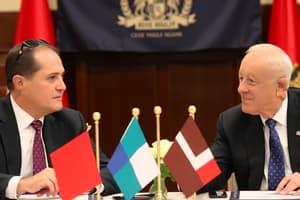Podcast
Questions and Answers
Which of the following factors does NOT influence the foreign policy of a state?
Which of the following factors does NOT influence the foreign policy of a state?
- Natural disasters (correct)
- International organizations
- Domestic economic capabilities
- Public opinion within the country
National interest is solely focused on the short-term goals of a state.
National interest is solely focused on the short-term goals of a state.
False (B)
What is meant by the term 'raison d'état' in relation to national interest?
What is meant by the term 'raison d'état' in relation to national interest?
It refers to the justification of a state's actions and policy towards other states.
Foreign policy is influenced by both external factors and __________ factors.
Foreign policy is influenced by both external factors and __________ factors.
Match the following terms with their correct descriptions:
Match the following terms with their correct descriptions:
What does A.K. Holsti define as national interest?
What does A.K. Holsti define as national interest?
Seabury provided only descriptive definitions of national interest.
Seabury provided only descriptive definitions of national interest.
According to the content, what primary instrument do states use to implement their national interest?
According to the content, what primary instrument do states use to implement their national interest?
National interest can be regarded as a _____ enterprise, leading to debates on whether it is a science or an art.
National interest can be regarded as a _____ enterprise, leading to debates on whether it is a science or an art.
Match the scholars with their definitions of national interest:
Match the scholars with their definitions of national interest:
Flashcards
National Interest
National Interest
The core goals and objectives a country aims to achieve in its dealings with other nations. It shapes a country's foreign policy.
Foreign Policy
Foreign Policy
The actions, decisions, and goals a state pursues in its interactions with other states.
Foreign Policy Behavior
Foreign Policy Behavior
The way in which a state behaves in its foreign affairs, often shaped by its national interest.
Instruments of Foreign Policy
Instruments of Foreign Policy
Signup and view all the flashcards
Systemic Factors in Foreign Policy
Systemic Factors in Foreign Policy
Signup and view all the flashcards
What is national interest?
What is national interest?
Signup and view all the flashcards
Realist perspective on national interest
Realist perspective on national interest
Signup and view all the flashcards
Idealist perspective on national interest
Idealist perspective on national interest
Signup and view all the flashcards
National interest: Objective or subjective?
National interest: Objective or subjective?
Signup and view all the flashcards
Plato's view on national interest
Plato's view on national interest
Signup and view all the flashcards
Study Notes
Foreign Policy and Diplomacy
- Foreign policy encompasses a state's actions, decisions, and goals towards the outside world.
- Systemic factors like international regimes, organizations, and great power dynamics influence a state's foreign policy.
- Internal factors such as economic, technological, and military capabilities also significantly impact policy.
- Leadership idiosyncrasies play a considerable role in shaping and implementing a country's foreign policy.
- National interest is a key driver behind foreign policy, often defined by short, medium, and long-term goals.
- States establish diplomatic relations and use tactics to achieve and maximize national interest.
- National interest is a central concept, debated regarding its precise meaning, scope, and content.
- Realist and idealist perspectives offer different interpretations of national interest.
- National interest is complex, incorporating various criteria including pragmatic, moral, legal, and partisan considerations.
- National interests can be categorized into short, medium, and long-term objectives.
- Instruments of foreign policy include diplomacy, economic instruments, propaganda, and the use of force.
- Diplomacy is crucial for resolving international conflicts and establishing relations.
- Economic instruments like sanctions, trade agreements, aid, and loans heavily influence external relations.
Studying That Suits You
Use AI to generate personalized quizzes and flashcards to suit your learning preferences.




